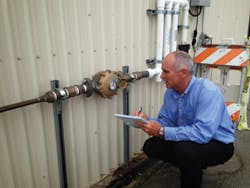Energy issues in Santa Barbara, CA, aren’t much different from other public agencies, says James Dewey, who manages the facilities and energy division for the city’s public works department. “There is an emphasis in the Santa Barbara area to do things as sustainably as possible. We’re after saving money and reducing our carbon footprint, so we’re always looking for different ways to do that.” That means engaging in energy conservation or efficiency while seeking opportunities to replace old mechanical equipment such as air-conditioning systems and pumps, which in turn decreases the deferred maintenance backlog. “We roll that into a large energy project where we can get incentive money from local utilities and possibly even grant-fund some of this,” notes Dewey. As division manager, Dewey oversees six programs: building maintenance, traffic signals, energy conservation and renewable energy development, environmental compliance, communications management, and custodial services.
What He Does Day-to-Day
Dewey’s days take him through the various management responsibilities of the division’s programs, such as developing large renewable energy projects like the cogeneration project at the El Estero Wastewater Treatment Plant or large solar energy projects for the public works’ Corporate Yard project. A lot of his time is spent finding better ways to do business. “Our division operates like a contractor,” he points out. “We provide services to all of the city departments. That includes not only maintenance, but we also charge back some of the work we do with remodels that are done for the Enterprise Funds, which are water and wastewater, the airport, the waterfront. I run this division like a private enterprise. We receive our revenue from other city departments.”
What Led Him to Go Into This Field
The mechanically inclined Dewey learned to work on cars in junior high school and found he enjoyed working with his hands. The son of a computer programmer, Dewey developed a fascination with his high school’s main frame computer and learned how to program in BASIC. The fascination continued into his adult years. After high school graduation, he attended the Universal Technical Institute in Phoenix, AZ, where he could specialize in air conditioning, heating, refrigeration, and solar energy.
“I really loved it because it was the right combination of science and technical things, along with being able to work with my hands,” says Dewey.
Soon after graduation, Dewey started his first commercial air-conditioning and refrigeration business. When electronic building controls became popular, Dewey added energy management services to his business. He sold his business and went to work for the University of California-Santa Barbara (UCSB) where he became the campus energy manager, and then associate director of facilities. He was both an employee and student, completing a degree in business economics.
“UCSB gave me an opportunity in that they had large industrial facilities,” points out Dewey. “It was also during the time when the California energy crisis was going on, so I got a lot of support for what I was doing as an energy manager.” Dewey reduced the campus’ energy consumption by up to 30% over a five-year period, saving an approximate $40 to $50 million. Six years ago, he left UCSB for the City of Santa Barbara.
What He Likes Best About His Job
“The city allows me to manage my budget and staff without a lot of interference,” says Dewey. “I not only get support from my management, but also from the city council and generally from the public. Most of the things we do here are popular. I enjoy coming in every day knowing there are a lot of opportunities where we can create projects and apply for grants to make things happen.”
His Greatest Challenge
Funding is Dewey’s biggest challenge as California recently disbanded the redevelopment agencies to save taxpayer dollars. “A lot of our capital maintenance hasn’t been funded,” says Dewey. “Trying to get money dedicated to maintaining our facilities and keeping them energy-efficient is always a challenge. Sometimes the last thing people want to hear about is how we need to have a contribution to our public facilities. Even though they are heavily used by the public, it’s hard to get people’s attention when a lot of people are suffering from the recession themselves.”
